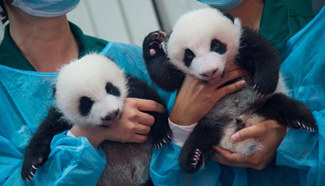BEIJING, Aug. 25 (Xinhua) -- China plans to lift the quality and standards for consumer goods through more market-oriented efforts and adopting a wider range of global standards within the coming five years, as part of the country's supply-side structural reform and boosting domestic consumers' confidence.
A new guideline on improving consumer goods' standards and quality (2016-2020), initiated by the General Administration of Quality Supervision, Inspection and Quarantine, was approved during the State Council's executive meeting on Wednesday, chaired by Premier Li Keqiang.
The new guideline is in line with the country's ongoing economic transition from an investment-driven economy to a more consumption-driven one. Final consumption already contributed 73.4 percent to China's gross domestic product (GDP) growth in the first half of 2016.
"Government departments should better enhance coordination, while enterprises need to have stronger emphasis on quality, branding, R&D and marketing. They also need to fully set up awareness of branding," Li said. "It is important that the quality of consumer goods made in China can withstand the test of the market."
Further steps will be taken to upgrade the standards for consumer goods, improve quality and enterprise competence, and develop more domestic brands with global appeal.
According to the new guideline, by 2020, more than 95 percent of consumer goods in major sectors will meet international standards.
There are issues yet to be addressed though. For example, the present criteria for consumer goods still lag behind the growing demand of domestic consumers. Meanwhile, Chinese brands still have a lot of work to do to build up their competitiveness.
During the meeting, Li highlighted the importance of product safety.
"Product safety comes first and foremost for improving consumer goods' quality and standards," Li said. "We should not leave product safety a matter of concern for consumers. The government should also innovate our supervisory methods."
Major efforts in the coming five years include upgrading the present standard of consumer goods, improving consumer goods' quality, building brands with a global reputation and optimizing the market environment. Next to such efforts, the government will also provide more financial and regulatory support for developing the sector.
Efforts in branding will be enhanced with the country's stronger protection and regulation of intellectual property rights, especially for patents and trademarks. Counterfeit and shoddy goods will also be primary targets for law enforcement. At the same time, consumer good producers will be inspected more regularly, and there will be more random checks.
The premier pointed out that upgrading consumer goods would go hand in hand with developing the equipment manufacturing industry.
"By improving the consumer goods sector, we will force the upgrading of equipment manufacturing," Li said. "The manufacturing industry is the cornerstone of the country's entire industry."
Li said that companies must make more efforts to train more highly skilled workers through cooperation with vocational educational institutions.
"We need to train more highly skilled workers and foster a culture of craftsmanship," the premier said.
Chinese consumption overseas reached 1.5 trillion yuan (226.15 billion U.S. dollars) in 2015, of which about half was spent on shopping, according to the Ministry of Commerce.










